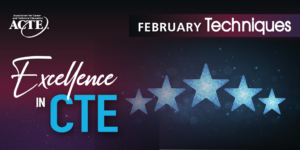Digital Promise, a global nonprofit, has partnered with ACTE to offer support for secondary and postsecondary educators seeking to integrate global learning into their curricula. Heather Singmaster, director of career and technical education (CTE) for Digital Promise, recently chatted with a few community college faculty members to discuss how they are creating more inclusive, engaging experiences for their students.
Those interviewed include:
- Laure Burke, Department Chair and Professor, Hospitality and Tourism Education Department, Kapi’olani Community College
- Takehiko Kozue, Professor, Hospitality and Tourism Education Department, Kapi’olani Community College
- Janette Roy, Assistant Professor and Program Coordinator, Hospitality Management, Harper College
- Arthur Salmon, Professor and Program Director, Cyber Security, College of Southern Nevada
What are the skills of global competence?
Laure Burke: The skills of global competence are important for hiring. They include communicating with diverse audiences, being curious, recognizing other perspectives, and taking action to make a difference both locally and globally. These are good human competencies. For example, we want to be curious instead of jumping to conclusions.
What connections can you make between your local and global industries?
Arthur Salmon: I teach data security and live and work in Las Vegas, Nevada. Sometimes people think that we only need to know local regulations. That’s not true anymore. The payment card industry is a good example of global impact. Companies like Visa and Mastercard have data security standards that vary. And we’re starting to see this need reflected in our accrediting bodies, which drive the industry. For instance, CompTIA now requires knowledge of European standards.
Takehiko Kozue: Globalization is standard in the hospitality industry. Employers want to hire people who understand customers from different global perspectives. Hospitality is all about face-to-face interaction, so human skills are incredibly important.
How do you integrate global learning into your courses?
Salmon: In a networking course, one assignment asked students to identify what standards are required to run cables into a small, new office. They needed to find all the national fire codes and the measurements required in the U.S., then they had to do the same for a different country. Because not only are power requirements different, but building code requirements also vary. Students have to consider factors they have never thought about before, and they are asked to think outside the box. Students may not end up working internationally, but these skills will help them in new environments.
Janette Roy: We talk about global competencies in all of my classes. Once, my students had an assignment with a scenario in which they had to open a new hotel in Spain. This gave students an opportunity to see how important it is to communicate and work with people from other backgrounds. And they learned an important lesson about gestures and body language meaning different things in different countries.
Burke: I built a global career exploration component into our Career and Customer Service class, which is required for all students. I connected them to international recruiters and helped them assess their skills using a gap analysis. A video interview with Kimo Kippen, formerly of Hilton International (included in the online tools from Digital Promise), served as a starting point. It was helpful to raise awareness of the value of skills like communicating with diverse audiences, being curious, and recognizing other perspectives.
How can global learning affect student development?
Kozue: When you first embed global learning into your courses, it may feel overwhelming. So I begin with simple assignments, and then we go into more complex or detailed issues. When students come to our campus, I want them to become engaged with the world around them. They need more opportunities to learn different perspectives.
Salmon: I think they find it to be interesting but also challenging. Many students approach global topics thinking they know a lot. Then they quickly realize it’s not as simple as they originally assumed.
Roy: They get very excited about the fact that they’re doing something that’s different. Once they’re aware of it, they really want to do it. But if nobody’s ever told you about something, it could seem difficult to understand.
How can global competence affect educators and the learning environment?
Burke: The Digital Promise training on global competencies helped me grow my own confidence as a professor and now as a department chair. I can be more supportive of international endeavors. And I’m better able to participate in building international partnerships.
Salmon: Within the field of cybersecurity, global knowledge is more important than ever. Consider, for example, how many people don’t understand where their data is and how that affects the way it is used. If the server is in the U.S., it’s governed under U.S. law. If the data is housed in Australia: Australian law. And while the cloud made things easier, it also made things harder. Because who would have jurisdiction over a server farm placed in international waters?
Roy: I just created a new destination marketing class where students will create a marketing campaign to promote an international city to tourists. The training we did really helped me make those connections easily. I also keep sharing at faculty meetings, because global competence really does fit into any course. There’s room for everybody.
Do you have advice for other faculty who want to add global skills and content to their courses?
Salmon: Keep going. The ability to think globally is crucial for our learners’ success. I know that revising curricula comes with a time commitment, but it’s a worthwhile endeavor. First, I looked at my existing assignments to figure out which ones were the easiest to integrate with global content, and I started with one. Once I took that first step, then I could take the next, and the next.
Burke: I recommend the training offered by Digital Promise. The program creates a supportive learning environment, alleviating any sense of pressure. And it enhanced my awareness about global learning.
Kozue: Our students are diverse. And their understanding of what is happening in the world could vary greatly from ours. This means we need to understand diverse perspectives and model that for our students. Trends change so fast that it’s hard to keep up, but as a faculty member, I try.
Roy: Don’t knock it until you try it. I was nervous at first because change is hard! Now I know I can do it, and I’m excited. So, learn more and report back to colleagues. They will get excited too. As a new department chair, I can model global competence and share how it benefits all students. It’s catching on!
Digital Promise, in partnership with ACTE, offers free, online, interactive self-paced training modules for secondary and postsecondary educators through CTE Learn. In addition, Digital Promise offers free tools and resources (and workshops for a fee).







